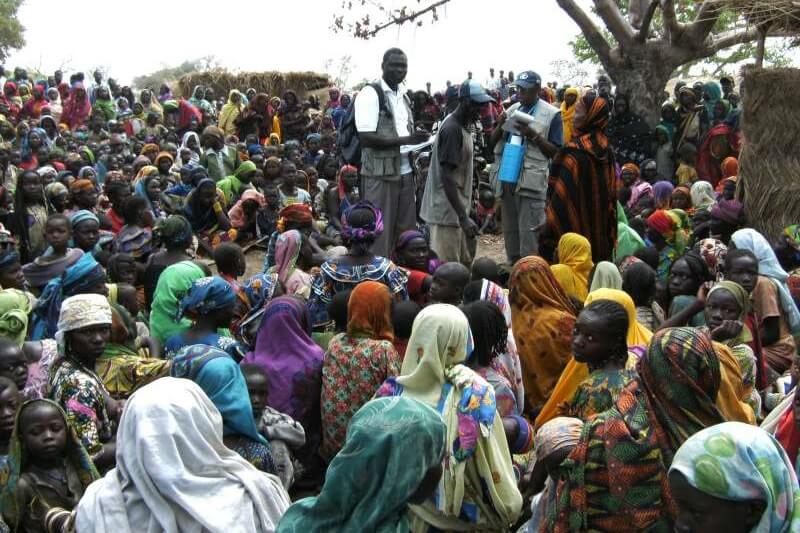Daniel Otera
A fresh humanitarian emergency is unfolding in Benue State, where government data reveals that 18,592 new persons have been displaced in Gwer West Local Government Area (LGA), intensifying a crisis that has already made the state home to one of Nigeria’s largest internally displaced populations.
Figures from the Benue State Emergency Management Agency (BSEMA) show that the new arrivals are now housed at a newly established camp located at NKST Primary School in Naka town.
According to official data, the displaced include 8,650 women, 4,147 men, 5,795 children, 325 pregnant women, 637 breastfeeding mothers, 1,315 persons with disabilities, and 571 elderly people spanning a total of 4,648 households.
This surge adds a critical layer to Benue’s overstretched humanitarian landscape, already buckling under years of protracted violence, displacement, and underfunded relief systems.
The addition of nearly 19,000 internally displaced persons (IDPs) in a single LGA is not an isolated event. Benue continues to shoulder the highest displacement burden in Nigeria’s North-Central region. According to the International Organisation for Migration (IOM), as of December 2023, the state hosted over 394,000 IDPs the highest figure recorded among the eight states affected by farmer-herder conflict.
The hardest-hit LGAs include Gwer West, Guma, and Agatu, all of which have suffered repeated waves of violence over the past five years primarily from communal clashes and armed herder attacks.
While the newly reported figure from BSEMA marks a localised emergency, it reflects a broader and persistent displacement pattern. Humanitarian dashboards from the National Emergency Management Agency (NEMA) place Benue consistently at the epicentre of internal displacement in the region, outpacing neighbouring states like Nasarawa and Plateau.
At a recent press briefing, BSEMA also shared details of its monthly relief package for IDPs and vulnerable groups.
The agency plans to distribute:
1,325 bags of rice
965 bags of beans
475 bags of garri
1,225 cartons of noodles
105 gallons of palm oil
83 cartons of seasoning
43 bags of salt

However, a basic breakdown shows just how insufficient these resources are. With 18,592 new IDPs in Gwer West alone excluding existing populations in camps across Guma, Logo, and Agatu LGAs this amounts to roughly:
One bag of rice for every 14 people
One gallon of palm oil for every 177 people.
The gap becomes more worrying when one considers the nutritional needs of vulnerable groups such as children, pregnant women, and the elderly.
The rising caseload has intensified concerns about the sustainability of Benue’s humanitarian system especially as the rainy season brings heightened risk of disease outbreaks due to overcrowded camps and poor sanitation infrastructure.
Although BSEMA has initiated assessments in new hotspots such as Taraku in Gwer East, thousands remain in informal settlements across the state unregistered and largely excluded from official aid channels.
According to IOM, a substantial number of IDPs in Benue live outside formal camps, often in host communities of makeshift shelters with minimal support. These individuals face elevated risks of neglect due to exclusion from formal tracking systems.
In its January 2025 Biometric Registration Report, IOM flagged Benue as one of the states with the highest number of unregistered IDPs, noting that repeated violence and poor infrastructure have hindered the rollout of coordinated support systems.
Compounding the challenge is the lack of disaggregated data on malnutrition rates, access to clean water, or the educational needs of displaced children making intervention planning and accountability more difficult.

While BSEMA acknowledged recent security interventions by the Federal Government including the deployment of the Chief of Army Staff to the state it framed the move as “decisive and proactive.” Yet the broader humanitarian situation remains fragile.
Though United Nations humanitarian access assessments tend to focus on Nigeria’s North-East, Benue continues to face critical constraints: sustained insecurity, mass displacement, and overstretched infrastructure.
As camps expand and figures grow, it is increasingly clear that emergency relief alone will not suffice. The state may need to begin transitioning from reactive measures to durable solutions such as voluntary return, structured resettlement, and community reintegration initiatives.
In his remarks, Mr James Iorpuu, Executive Secretary of BSEMA, described the monthly aid distribution as “a message of hope” and a commitment to ensuring that “no vulnerable person is left behind.”
Yet the data paints a more sobering picture: 18,592 new IDPs in Gwer West are not just numbers they represent disrupted lives, shattered livelihoods, and uncertain futures.

